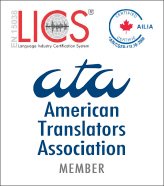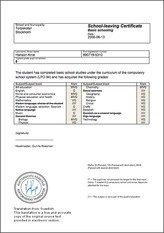Certified Translation
We perform certified translations online! The definition of a certified translation is country-specific, to a great extent.
In general, a certified translation is one performed by a professional translator who has been recognised by the appropriate authority. The process of certification as well as the necessary authority varies from country to country. The translation is generally accompanied by a signed statement attesting that the certified translator is competent in the source and target languages and that the certified translation is an accurate rendition of the source document. A stamp on the document itself can also be used.
Different institutions and governmental organisations and agencies, and even non-governmental organisations such as private universities, have distinct requirements for certified translation. Documents that may require certified translation include, but are not limited to
- Birth certificates
- Diplomas
- Marriage certificates
- Medical records
- Passports
- Financial records, etc.
Certified Translation Service, Sworn Translators
The Native Translator provides sworn and certified translation in more than 100 languages for over 100 countries, taking no more than 1-2 days! At TNT, certified translation services are performed by translators all over the world, who are accredited and/or sworn for one or more language pairs and are thus authorised to carry out the translation and certification of documents for legal purposes. Please note that a certified translation produced by a certified translator in one country may not necessarily be valid or accepted in another. Within the European Union however, translations carried out by a certified translator are accepted in all other member counties according to the EU Services Directive.
Send us your Document:
You can send your document for certified translation by clicking on the “Submit document” button, and you will receive an instant quote. You can also contact us directly on email for additional information.
Below you will find a few examples of the different requirements for certified translation in different countries:
- Netherlands
Only sworn translators acknowledged by the Dutch Court are entitled to perform certified translation of official documents such as birth/marriage certificates, diplomas, etc. - Belgium
In Belgium, a distinction is made between sworn and legalised translation. Sworn translations bear the signature and/or stamp of the translator while a legalised translation also requires a stamp from the court where the translator has been sworn. - Greece
Certified translation performed by a lawyer or by the Greek Foreign Ministry’s Department of Translation. Occasionally, certified translation can be carried out by an individual certified translator, although such translators are difficult to locate. - Norway
STATSAUTORISERTE TRANSLATØRERS FORENING (STF) – The Association of Government Authorised Translators in Norway
Members of this association have passed a demanding translation written and oral examination in translation, in the languages concerned. This certification represents the highest possible Norwegian qualification for translations of specialised, industry-specific texts into and from Norwegian. Translators possessing this certification are authorised by the Norwegian government to place their stamp and signature on documents, along with the words “True Translation Certified”, thus constituting a certified translation. - Denmark
Certified translations are only immediately valid as legal documents if performed by state-authorised translators. The Danish Ministry of Foreign Affairs can ‘legalise’ a certified translation for further proof of legal validity. This occurs by authenticating the signature of the translator.
If a document is intended for use in non-signatory country then that particular country’s diplomatic representation in Denmark are required to legalise the document. - Venezuela
In Venezuela, a sworn or certified translator (Interprete Publico) is authorised following the awarding of a degree by the Ministry of Internal Affairs and Justice. Any document from a foreign language will only have recognised legal value in Venezuela if translated by such a certified translator. - Argentina
In compliance with Law #20,305, all public documents (including personal papers and some commercial contracts) have to be translated and signed by a "certified public translator," whose seal and signature have to be legalized on each document by the translators' professional body of jurisdiction. - Germany
German regional courts (Landgerichte) have the power to appoint "sworn translators". - Indonesia
In Indonesia, a sworn translator is often referred to as an authorised or certified translator - they are people who have attended and passed translator qualification examinations in the legal field as organised by the School of Linguistics and Cultural Sciences at the University of Indonesia (FIBUI). After passing, they will then take an oath before the Governor of DKI Jakarta. - Italy
Both Italian courts and consulates have the power to appoint as "official translators" candidates who pass an examination or present proof of their language proficiency (usually a university degree). - Mexico
In Mexico, some local institutions, such as the Superior Court of Justice, require that a written and oral examination be passed for a translator to be recognized as an expert or "sworn" translator. - Poland
The standards of translation in Poland are regulated by the relevant department of the Ministry of Justice and every translator wishing to provide such services must pass a formal examination. - South Africa
In South Africa, a translator must be authorised by the High Court, and must use an original (or a sworn copy of an original) in his/her physical presence as the source text. Translators may only swear by their own translations. There is no requirement for an additional witness (such as a notary) to confirm the authenticity of the certified translation. - Spain
Only sworn translators can produce a sworn translation in Spain. To become a sworn translator in Spain, the candidate has to pass an exam set by the Spanish Ministry of Foreign Affairs and Cooperation. - Sweden
The "Kammarkollegiet" is an official agency that authorises interpreters and translators, who must first pass a stringent examination set by the organisation. Authorised translators hold a protected professional title, and their certified translations are considered legal and binding for all legal purposes. - United States of America
The U.S. Department of Labor, Bureau of Labor Statistics states: "There is currently no universal form of certification required of interpreters and translators in the United States, but there are a variety of different tests that workers can take to demonstrate proficiency."
We also provide high quality specialised translations - read more under the heading Our Services - Translations.




